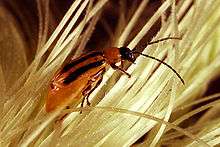Diabrotica
| Diabrotica | |
|---|---|
 | |
| Scientific classification | |
| Kingdom: | Animalia |
| Phylum: | Arthropoda |
| Class: | Insecta |
| Order: | Coleoptera |
| Family: | Chrysomelidae |
| Subfamily: | Galerucinae |
| Tribe: | Luperini |
| Genus: | Diabrotica Chevrolat in Dejean, 1836 [1] |
| Species | |
|
Diabrotica balteata | |
| Wikispecies has information related to: Diabrotica |
Diabrotica is a widespread genus of beetles, sometimes referred to as cucumber beetles or corn rootworms, in the family Chrysomelidae. Members of this genus include several destructive agricultural pest species.
Range
Corn rootworms are one of the most economically significant consumers of maize in the United States.[2] The western corn rootworm, D. virgifera virgifera, and the northern corn rootworm, D. barberi, are the most significant rootworm species in Iowa, a major corn-growing area. A third species, the southern corn rootworm, D. undecimpunctata howardi, causes much economic damage in other regions.[3] Corn rootworm larvae can destroy significant acreage of corn if left untreated. In the United States, current estimates show 30 million acres (12×106 ha) of corn, out of 80 million total are infested with corn rootworm. Estimates of economic damage to corn growers from the pest are about $1 billion.[4]
Diabrotica was unknown in Europe until the late 1990s and was forbidden even in laboratories because of the difficulty in eliminating it with insecticides. It appears to have entered Europe from the US in large numbers during the Yugoslav wars and is especially widespread around US military airports, whose planes were likely to have transported the pest. It has since spread primarily in Italy, France and Germany.[5]
Species
Several species of Diabrotica are significant insects of North America, including:
- D. balteata - banded cucumber beetle
- D. barberi - northern corn rootworm
- D. undecimpunctata
- D. u. howardi - spotted cucumber beetle (southern corn rootworm)
- D. u. tenella - western cucumber beetle
- D. u. undecimpunctata - western spotted cucumber beetle
- D. virgifera
- D. v. virgifera - western corn rootworm
- D. v. zeae - Mexican corn rootworm
D. undecimpunctata
Adults of D. undecimpunctata are greenish-yellow with six large black spots on each elytron. They are about .2 inches (5.1 mm) long. The larvae are yellowish and wormlike.
D. virgifera
Adult rootworms are about .25 inches (6.4 mm) long. Western corn rootworm adults are yellowish with a black stripe on each wing cover. Northern corn rootworm beetles are solid in color and vary from light tan to pale green.[6] The eggs are deposited in the soil during the summer, and are football-shaped, white, and less than 0.004 inches (0.10 mm) long. Larvae hatch in late May or early June and begin to feed on corn roots. Newly hatched larvae are small, less than .125 inches (3.2 mm) long, white worms. They go through three larval instars, pupate in the soil and emerge as adults in July and August, with one generation per year. Larvae have brown heads and a brown marking on the top of the last abdominal segment, giving them a double-headed appearance. Larvae have three pairs of legs, but these are not usually visible without magnification. After feeding for several weeks, the larvae dig a cell in the soil and molt into the pupal stage. The pupal stage is white and has the basic shape of the adult.
References
- ↑ "Diabrotica". Integrated Taxonomic Information System.
- ↑ Wright, R.; Meinke, L.; Jarvi, K. (July 1999). "Corn Rootworm Management". University of Nebraska. Retrieved 2007-02-03.
- ↑ Staff, Purdue University Extension Service. Corn Rootworms
- ↑ Marra, M.C., Piggott, N.E., & Goodwin, B.K. (2012). The impact of corn rootworm protected biotechnology traits in the United States. AgBioForum, 15(2), 217-230
Erin W. Hodgson, Utah State University Extension and Utah Plant Pest Diagnostic Laboratory. Western corn rootworm - ↑ Miller N et al. Multiple Transatlantic Introductions of the Western Corn Rootworm Miller, N.; Estoup, A; Toepfer, S; Bourguet, D; Lapchin, L; Derridj, S; Kim, K. S.; Reynaud, P; Furlan, L; Guillemaud, T (2005). "Multiple Transatlantic Introductions of the Western Corn Rootworm". Science 310 (5750): 992. doi:10.1126/science.1115871. PMID 16284172.
Kiss, J. Edwards et al. (2005). Vidal, Stefan; Kuhlmann, Ulrich; Edwards, C. Richard, eds. Monitoring of western corn rootworm (Diabrotica virgifera virgifera LeConte) in Europe 1992-2003. Western Corn Rootworm: Ecology and Management (CABI). ISBN 978-0-85199-070-5. - ↑ Wright, Meinke & Jarvi 1999.
External links
- Diabrotica balteata on the UF / IFAS Featured Creatures Web site
- Diabrotica undecimpunctata howardi on the UF / IFAS Featured Creatures website.